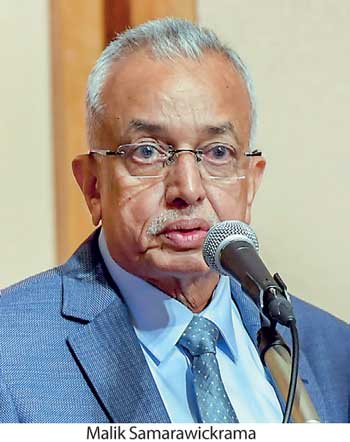16 Mar 2018 - {{hitsCtrl.values.hits}}
 By Chandeepa Wettasinghe
By Chandeepa Wettasinghe
The Sri Lankan government this week invited Japanese investors to set up export-oriented industries in the upcoming industrial zones and offered Japan the opportunity to develop its own industrial zone in Sri Lanka.
Currently, a logistics and industrial zone is being developed in Hambantota with Chinese investment, while Rojana Corporation of Thailand, which is a joint venture with Nippon Steel and Sumikin Bussan Corporation of Japan, is setting up an industrial zone in Kalutara.
“We invite Japanese firms to invest in these zones and indeed we are willing to set up a dedicated industrial zone for export-oriented Japanese firms,” Development Strategies and International Trade Minister Malik Samarawickrama said yesterday at a forum held in Tokyo organised by the Japan External Trade Organisation and Sri Lanka’s Board of Investment.
Samarawickrama, who accompanied President Maithripala Sirisena on his state visit to Japan, said that Sri Lanka is seeking Japanese investors in sectors such as medical devices, automotive parts, electronic components, mineral-based products and logistics and hub operations.
Samarawickrama wooed the potential Japanese investors highlighting the success found by their peers in Sri Lanka already, with investments by Onomichi Dockyard, Noritake, Itochu, SBI Holdings, Okaya Electric Industries, Toslec, FDK, SG Holdings and Nippon Coke & Engineering.
“Sri Lankan companies are supplying high-end components to Japanese companies like Sumitomo Wiring, Toyota, Nissan and Mitsubishi. There is a level of skill and quality among Sri Lankan workers that have impressed many Japanese companies,” he added.
Samarawickrama said that the Japanese could take advantage of Sri Lanka’s geographic positioning, existing economic and trade agreements with Pakistan, India, Singapore and Europe and the upcoming pacts with China, India, Thailand and Malaysia to potentially manufacture and deliver products to markets with population exceeding 3.5 billion.
He further said that the Central Bank allowing market rates to determine the rupee and targeting inflation, along with the Treasury creating a more transparent and simpler taxation system and committing to fiscal discipline, macroeconomic stability is present in Sri Lanka for the Japanese investors.
Samarawickrama said that the government is looking to improve the ease of doing business rankings for Sri Lanka and the length of time required for businesses to register, find land and register property are expected to fall drastically this year due to these improvements.
Japanese investments are also protected, he said.
“We are proud of the investment frameworks we have in our country and can assure you that you will be treated fairly. Our two countries entered into a ‘Bilateral Investment Promotion and Protection Treaty’ in 1982 and a ‘Double Tax Avoidance Agreement’ back in 1967,” he added.
However, Samarawickrama chose not to enlighten the Japanese audience on the Sri Lankan government’s incapability to even control one case of traffic-related violence, which erupted into massive communal unrest just a week earlier, due to further police inaction, which resulted in the government banning certain social media channels for nearly two weeks, to ease tensions.
The unrest between Buddhist extremists and Muslims contributed to a flux in markets and the social media ban hurt the small and medium-scale businesses.
Analysts Mirror Business spoke to were left wondering how the country could inspire the confidence of investors in countries such as Singapore and Japan, where investor forums were held this month, if the government is incapable of enforcing the rule of law.
The local trade chambers have called on the government to take swift action on individuals, who were responsible for the unrest, in order to send a message to the potential troublemakers and to rebuild confidence among foreign investors that there is no room for similar situations in the future.
The government was criticized for keeping the social media ban for longer than necessary, with critics perceiving the ban as being enforced for an extended period of time due to the criticism the government is receiving over its inability to control the situation.
The incident follows the Rajapaksa faction’s—which is pro-China in international relations—won the local government election last month, in an upset for the incumbent central government.
The current government is perceived as being friendlier with the West, India and Japan, although it has warmed up to China now compared to when it came into power in 2015.
19 Nov 2024 17 minute ago
19 Nov 2024 3 hours ago
18 Nov 2024 18 Nov 2024
18 Nov 2024 18 Nov 2024
18 Nov 2024 18 Nov 2024